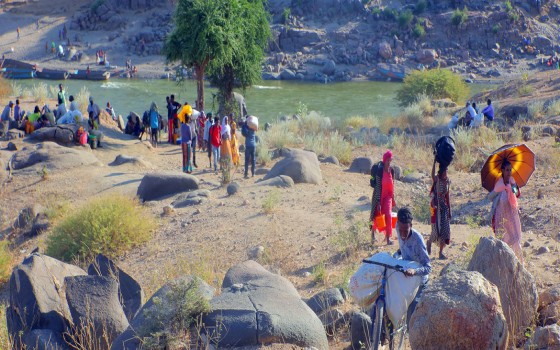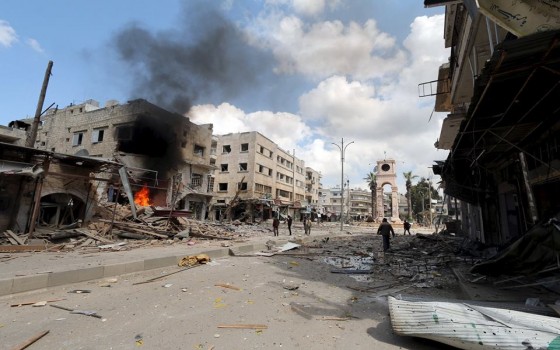
UN: Food security deteriorates in Sudan after famine declared in five regions

- Europe and Arabs
- Wednesday , 25 December 2024 9:51 AM GMT
Khartoum - New York: Europe and the Arabs
The Secretary-General of the United Nations, Antonio Guterres, expressed concern about the rapid deterioration of the food security situation in Sudan, as access to food and nutrition continues to deteriorate for millions of people across the country according to the Integrated Food Security Phase Classification. According to the United Nations daily news bulletin,
The report of the Famine Review Committee of the Integrated Food Security Phase Classification announced the outbreak of famine in at least five regions in Sudan, expecting that five additional regions will face famine between December 2024 and May 2025.
The report, which was issued today, Tuesday, also revealed that the risk of famine threatens 17 additional regions.
In a statement attributed to the Assistant Spokesperson for the Secretary-General of the United Nations, Guterres said that after more than 20 months of conflict, more than 24.6 million people in Sudan face high levels of acute food insecurity.
The United Nations and its partners are working to scale up the delivery of food assistance and other essential support to the most vulnerable, but ongoing fighting and restrictions on the movement of relief supplies and personnel continue to put relief operations at risk, he added.
The Secretary-General renewed his call on the parties to facilitate rapid, safe, unfettered and sustained access so that humanitarian aid and workers can reach people in need wherever they are.
He also stressed the need for an immediate cessation of hostilities to save lives and prevent the crisis in Sudan and its impact on neighbouring countries from escalating further in 2025.
He appealed for urgent international support and cooperation to bring the parties closer to a peaceful resolution of the conflict through a permanent ceasefire and increased funding for humanitarian action.
Unprecedented intensification and expansion
The Famine Review Panel report said that what the report revealed represents an unprecedented intensification and expansion of the food and nutrition crisis, driven by a devastating conflict that has caused unprecedented mass displacement, economic collapse, the collapse of basic social services, severe community unrest and limited humanitarian access.
The Integrated Food Security Phase Classification (IPC) is a global initiative involving UN agencies, regional partners and relief organizations. It classifies food insecurity into five phases. Famine is the fifth phase of the classification, meaning that at least one in five people or families are severely food insecure and at risk of starvation.
Ongoing famine
According to the Famine Review Committee report, the famine that was declared in August 2024 in Zamzam camp in North Darfur State, continued and spread to Al Salam and Abu Shouk camps and the Western Nuba Mountains from October to November 2024.
He added that the famine is expected to expand between December 2024 and May 2025 in areas of North Darfur, including Umm Kadada, Mellit, El Fasher, El Taweisha and El Lait.
He warned that the risk of famine looms in the Central Nuba Mountains, and in areas likely to witness large influxes of internally displaced persons in North and South Darfur.
Acute food insecurity
The report showed that food insecurity is at worse levels than expected, with 24.6 million people expected to face high levels of acute food insecurity, or IPC Phase 3 or above, between December 2024 and May 2025.
It indicated that these results represent a sharp increase of 3.5 million people compared to the originally expected number, equivalent to more than half of Sudan’s population.
The report provides an update to previous projections published in June 2024 for the period from October 2024 to February 2025.
Slight improvement
The report indicated that despite these figures, there is a slight improvement in terms of the extent of acute food insecurity compared to the lean season (June – September 2024).
It explained that above-average rainfall has supported agricultural activities as security conditions have allowed farmers to access fields and agricultural inputs, thus alleviating food insecurity. As a result, the number of people in IPC Phase 3 or above has declined during the lean season.
However, he noted that not all people have benefited equally. In areas with high levels of conflict, hostilities have severely disrupted agricultural activities, leading to farmers abandoning and looting their crops and destroying livestock.
Displaced families, especially those living in settlements and public buildings, are unlikely to benefit significantly from the harvest, he said.
Call for more support for Sudanese refugees in Libya
In another development, the UN Refugee Agency (UNHCR) has called for increased financial support to meet the growing needs of Sudanese refugees arriving in Libya as numbers increase and temperatures drop.
The number of Sudanese refugees seeking safety in Libya has doubled since the beginning of the year, with an estimated 400 refugees arriving in the country every day, the agency said in a statement issued on Tuesday.
UNHCR said it is present in Kufra, the main entry point from Sudan, and is providing life-saving assistance to refugees in support of local authorities and host communities. This includes enhancing access to healthcare, improving living conditions through the distribution of relief supplies, and enhancing access to documentation provided by local authorities to improve freedom of movement and protection. Refugees and host communities in remote areas such as Kufra face particularly harsh conditions, including food prices in Kufra that are 19 per cent higher than the national average due to disruptions in supply chains, high demand and fuel shortages, she warned.
“In addition to the commitment of the Libyan authorities and communities to support Sudanese fleeing the conflict, additional support from the international community is needed to enhance access to food, clean water, health and education,” said Aseer Al-Mudhain, UNHCR’s Chief of Mission in Libya. “Refugees in Libya have endured enormous hardship on their journey here. As we enter a new year, we must act quickly to prevent further suffering and protect lives,” she added. UNHCR is leading the inter-agency response to the Sudanese crisis in Libya. As part of this response, UNHCR is seeking US$22 million to respond to the estimated needs of 449,000 refugees and host communities by the end of 2025.












No Comments Found